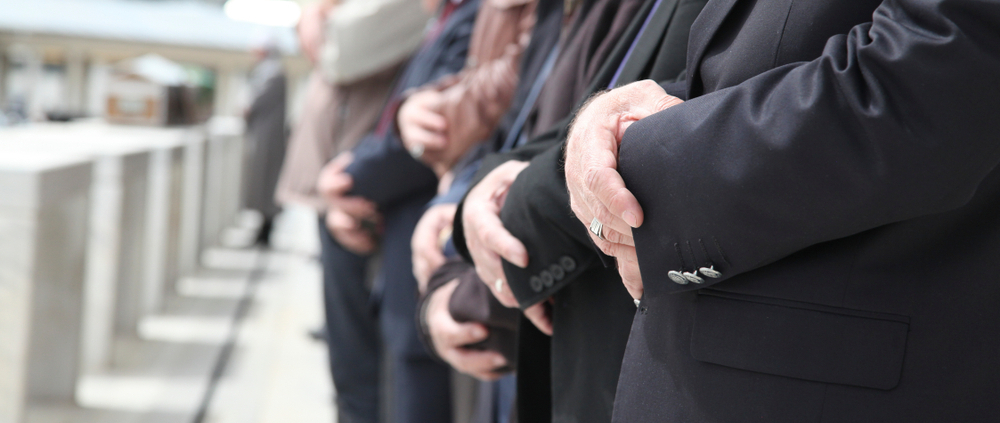Can One Partake of Meals Prepared By The Deceased’s Family at The Funeral?
Shafi'i Fiqh
Answered by Shaykh Irshaad Sedick
Question
Please clarify the following issues in the Shafi’i School:
- Partaking of meals at the home of the deceased.
- Is it the same rule in the funeral house?
If a person (e.g., family, neighbors, friends, etc.) goes for consolation in the deceased’s home on the first, second, or third day and is served some sweets or something to drink, will it be permissible for him to accept it? Similarly, if he comes for consolation at mealtime and is asked to partake of meals, will it be permissible for him to partake of meals at the deceased’s home?
Answer
In the Name of Allah, the Most Merciful and Compassionate.
May Allah alleviate our difficulties and guide us to what pleases Him. Amin.
1). It is recommended that distant relatives and neighbors prepare enough food for the deceased’s close family relatives to suffice them for one day and night and to urge them to eat. However, for the deceased’s family to prepare food and gather people over it is an unpraiseworthy innovation. Suppose one happens to be at the deceased’s home, and the family serves food out of hospitality. In that case, it is permissible to partake and share in the food given to the grieving family, and Allah knows best.
2). The matter is independent of the venue but rather who prepares the food. The Prophet (Allah bless him and give him peace) established the Sunna of feeding the grieving family who would usually be preoccupied with the funeral and their grief, and Allah knows best.
It was narrated that when the Prophet (Allah bless him and give him peace) heard that his cousin Ja’far Ibn Abi Talib (Allah be pleased with him) had died in the Battle of Mu’ta, he (Allah bless him and give him peace) told his family to make food for the family of Ja’far, and said, “Because there has come to them that which will preoccupy them (grieving the deceased loved one).” [Tirmidhi; Hakim]
It was narrated that Jarir ibn’ Abd-Allah al-Bajali (may Allah be pleased with him) – one of the Companions of the Prophet (Allah bless him and give him peace) – said, “We used to count gathering at (around) the family of the deceased and their making food (after the burial) to be a kind of wailing (niyaha).” [Ahmad; Ibn Majah]
Additional Caution Against Preparing Food From the Deceased’s Estate
Ibn Hajar al-Haytami (Allah have mercy on him) specified that: “It is not permissible to prepare food for the mourners (and wailers) from the estate of the deceased unless they have no outstanding debt, none of the heirs will be deprived (as a result of the feeding), and that none of them is absent. If they prepare food regardless of that, they are sinful for doing so and are liable for what was spent.” [Ibn Hajar, Tuhfat al-Muhtaj]
Preparing Food For The Funeral Assistants
It is permissible for the family to prepare food for those who assisted with the funeral preparations, such as the ghusl, shrouding, and burial, even as compensation for their services, and Allah knows best. [Hamadi, Fath al-Wahhab al-Malik]
Exception to the Rule
However, some Hanbali scholars indicated an exemption to the above. Suppose guests come to the deceased’s family during mourning. In that case, there is nothing wrong with the family making food for them for hospitality (instead of explicitly having people gather for food because of the funeral). There is nothing wrong with the household inviting whoever they want of their neighbors and relatives to eat with them from the food given to them.
Ibn Qudama said: “If there is a need for that, it is permissible, for perhaps people have come to attend the funeral from other cities and distant places and stayed overnight with them, and they have no option but to show them hospitality.” [al-Mughni 3/497].
The Prophet Muhammad (Allah bless him and give him peace) said, “Whoever believes in Allah and the Last Day, let him be generous to his guest” [Bukhari]. Offering a meal or snacks to guests is considered a virtuous act.
I pray this is of benefit and that Allah guides us all.
[Shaykh] Irshaad Sedick
Checked and Approved by Shaykh Faraz Rabbani
Shaykh Irshaad Sedick was raised in South Africa in a traditional Muslim family. He graduated from Dar al-Ulum al-Arabiyyah al-Islamiyyah in Strand, Western Cape, under the guidance of the late world-renowned scholar Shaykh Taha Karaan.
Shaykh Irshaad received Ijaza from many luminaries of the Islamic world, including Shaykh Taha Karaan, Mawlana Yusuf Karaan, and Mawlana Abdul Hafeez Makki, among others.
He is the author of the text “The Musnad of Ahmad ibn Hanbal: A Hujjah or not?” He has served as the Director of the Discover Islam Centre and Al Jeem Foundation. For the last five years till present, he has served as the Khatib of Masjid Ar-Rashideen, Mowbray, Cape Town.
Shaykh Irshaad has thirteen years of teaching experience at some of the leading Islamic institutes in Cape Town). He is currently building an Islamic online learning and media platform called ‘Isnad Academy’ and has completed his Master’s degree in the study of Islam at the University of Johannesburg. He has a keen interest in healthy living and fitness.
